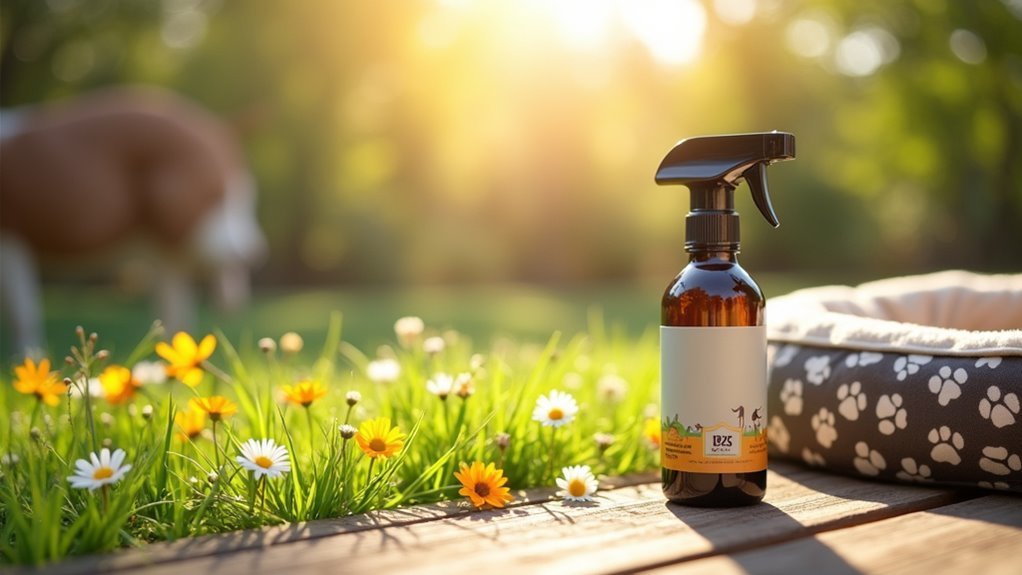You’ll need different pest control strategies as seasons change to protect your pets year-round. Start with flea and tick prevention by March, then focus on mosquito and fly protection during summer heat. Fall requires rodent-proofing your home before temperatures drop, while winter demands ant control as they seek indoor warmth. Natural repellents like essential oils, diatomaceous earth, and citrus peels offer safe alternatives throughout all seasons. These targeted approaches will help you stay ahead of seasonal pest challenges.
Spring Flea and Tick Prevention for Your Pets

As spring arrives in Texas, you’ll need to start your flea and tick prevention strategy by March since the warm, humid conditions create the perfect breeding ground for these persistent pests.
Fleas reproduce at alarming rates, laying up to 50 eggs daily, making early intervention essential for effective pest control. Regular grooming helps you identify these parasites before they cause skin irritations or transmit diseases to your pets.
Early detection through regular grooming prevents flea infestations from spiraling out of control before health problems develop.
Integrate veterinarian-recommended medications into your routine for continuous protection against infestations.
Professional pest control experts recommend maintaining clean environments by washing pet bedding and vacuuming areas where your pets spend time.
Pet owners should prioritize pet-safe pest control methods that protect both their animals and family from harmful chemicals while ensuring thorough flea and tick prevention throughout the season.
Summer Protection Against Mosquitoes and Flies
When summer heat intensifies across Texas, mosquitoes and flies become aggressive threats to your pets’ comfort and health.
These pests can transmit heartworms to pets, making monthly heartworm medication essential during peak mosquito season. Fly bites irritate sensitive areas like your pet’s ears, so apply petroleum jelly as a protective barrier or use fly repellent sprays for relief.
Effective pet-friendly pest control starts with keeping your yard clean.
Promptly dispose of dog waste and leftover food to reduce fly attraction. Implement mosquito control methods by eliminating standing water around your property where mosquitoes breed.
Apply pet-safe repellents to considerably reduce mosquito presence.
These proactive measures protect pets from uncomfortable bites while safeguarding their overall health throughout summer months.
Fall Preparation for Rodent-Proofing Your Home

Fall’s cooler temperatures shift your pest control focus from outdoor flying insects to indoor rodent prevention. As temperatures drop, rodents actively seek warm shelter and food sources, making fall preparation essential for rodent-proofing your home.
When autumn arrives, smart homeowners pivot their pest strategy from summer’s flying bugs to preventing winter’s rodent invasions.
You’ll need to seal cracks and holes in foundations and siding to prevent entry points. Store pet food in airtight containers rather than leaving it in food bowls overnight, and promptly clean spilled kibble.
Inspect door and window screens for gaps that rodents exploit. Maintain a clean yard by removing debris and clutter that creates hiding spots.
These pest control methods help prevent infestations while keeping your pets safe. Consider consulting professional pest control services for expert advice on keeping your home pest-free during fall’s challenging season.
Winter Ant Control and Indoor Pest Management
While outdoor temperatures plummet, ants don’t simply disappear—they move indoors seeking warmth and food sources, creating new challenges for pet owners during winter months.
Effective ant control starts with sealing cracks and gaps that serve as entry points. Your indoor pest management strategy should include regular vacuuming to eliminate food particles and potential nesting sites that attract winter pests.
Store pet food in airtight containers and monitor food storage areas consistently. Use pet-safe bait stations and traps to control ant populations without endangering your animals. These pest control methods provide targeted solutions while protecting your pets from harmful chemicals.
For persistent infestations, consult professional pest control services specializing in pet-friendly approaches. They’ll offer effective treatment options tailored to homes with animals, ensuring thorough winter pest management.
Year-Round Natural Repellents Safe for Animals

Natural repellents offer pet owners effective, chemical-free solutions that work throughout every season without compromising their animals’ health.
You can use essential oils like lavender, peppermint, and eucalyptus as safe pest deterrents when properly diluted. Diatomaceous earth provides non-toxic powder protection that controls pests without harming your animals.
Vinegar’s strong smell repels ants and insects while keeping pets away from harmful chemicals. Citrus peels from lemons and oranges naturally deter spiders through their oils.
Create effective barriers by mixing water with essential oils in spray bottles around pet areas. These natural repellents eliminate the need for a pest control company while maintaining year-round control against unwanted insects and pests.
Frequently Asked Questions
What Is the Best Pest Control When You Have Pets?
You’ll want to choose specifically labeled pet-safe products and consult professionals about non-toxic treatments. Remove pets during applications, use veterinarian-recommended preventatives, and maintain cleanliness through regular grooming and vacuuming.
How Do You Get Rid of Bugs Without Harming Pets?
You can eliminate bugs safely by using natural repellents like essential oils, diatomaceous earth, and regular vacuuming. Choose pet-labeled products, consult your veterinarian, and keep pets away from treated areas until dry.
Is Annual Pest Control Worth It?
Annual pest control’s definitely worth it if you’re concerned about your pets’ health and safety. You’ll prevent infestations, save money on vet bills, and maintain a cleaner environment that keeps your pets comfortable year-round.
Where Can I Take My Pet for Pest Control?
You can take your pet to veterinary clinics for pest control consultations and treatments. Local pet stores also offer safe pest control products, while professional companies provide pet-friendly home assessments.
In Summary
You’ve got the tools to protect your pets year-round from seasonal pests. Don’t wait until you spot fleas, ticks, or other unwelcome visitors—prevention’s always easier than treatment. Stick to your seasonal schedule, rotate between commercial and natural solutions, and you’ll keep your furry friends comfortable while maintaining a pest-free home. Remember, consistency’s key, and when you’re proactive, you’re giving your pets the protection they deserve.





Leave a Reply